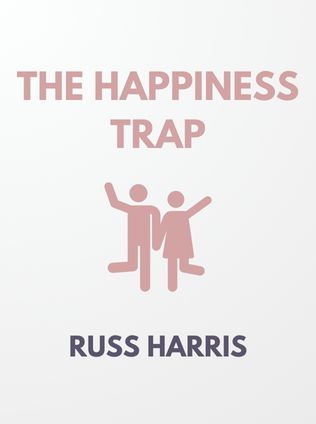
The Happiness Trap
How to Stop Struggling and Start Living
By Russ Harris
Published 01/2007
About the Author
Russ Harris is a distinguished figure in the realm of psychological well-being, particularly renowned for his expertise in Acceptance and Commitment Therapy (ACT). Originally trained as a medical doctor, Harris encountered numerous patients whose physical ailments were deeply intertwined with their emotional and psychological struggles. This realization led him to explore the intricate workings of the human mind, and eventually, he transitioned from a traditional medical career to one centered on mental health. His work is deeply rooted in the belief that psychological suffering is an inevitable part of the human experience, and that the relentless pursuit of happiness, as commonly understood, often exacerbates this suffering. Through his bestselling book, "The Happiness Trap", Harris provides a practical guide for readers to navigate their thoughts and emotions, promoting a life of genuine fulfillment and psychological flexibility.
Main Idea
"The Happiness Trap" challenges the pervasive notion that happiness is a natural state that everyone should strive to achieve and maintain. Harris argues that this belief ensnares people in a cycle of relentless pursuit, where the harder they chase happiness, the more elusive it becomes. Instead of striving for a perpetual state of happiness, Harris introduces Acceptance and Commitment Therapy (ACT) as a means to embrace life's inherent difficulties and focus on living a meaningful life aligned with one's values. ACT teaches that negative thoughts and feelings are a normal part of the human experience and that instead of trying to eliminate them, individuals should learn to accept them and commit to actions that are in line with their true values.
Table of Contents
- Understanding the Happiness Trap
- The Evolutionary Basis of Our Struggles
- The Principles of Acceptance and Commitment Therapy (ACT)
- Connecting with the Observing Self
- Defusion: Separating from Thoughts
- Expansion: Making Room for Emotions
- Connection: Being Present in the Moment
- Clarifying Values
- Committed Action
- Conclusion: Escaping the Happiness Trap
Understanding the Happiness Trap
From the outset, Harris dismantles the idea that happiness is a natural and constant state that we should all be able to achieve and maintain effortlessly. He argues that the belief in the necessity of perpetual happiness sets us up for failure and disappointment. This belief leads to what Harris calls the "happiness trap"—a cycle where the more we strive to be happy, the more we feel unhappy. The problem, Harris asserts, is not that we experience negative emotions, but that we believe we shouldn't.
The modern obsession with happiness is further exacerbated by societal messages that equate happiness with success and fulfillment. We are constantly bombarded with images of people who appear to have it all—wealth, beauty, intelligence, and happiness. These images create an unrealistic standard that we feel compelled to meet, leading us to chase happiness as if it were a tangible goal. The result is a constant struggle against the natural ups and downs of life, where any deviation from happiness is seen as a failure.
"The belief that we should be happy all the time is the root cause of much of our psychological suffering." - Russ Harris
Harris introduces the concept of psychological flexibility as a way out of the happiness trap. Psychological flexibility involves being open to experiencing the full range of human emotions, both positive and negative, and committing to actions that are in line with our values, even when we are feeling uncomfortable. This approach is at the heart of Acceptance and Commitment Therapy (ACT), which Harris advocates as a more realistic and fulfilling way to navigate life.
The Evolutionary Basis of Our Struggles
To understand why we fall into the happiness trap, Harris delves into the evolutionary origins of our psychological tendencies. He explains that the human brain has evolved over millions of years to help us survive in a world full of threats. This evolutionary history has endowed us with certain traits that were once essential for survival but are now maladaptive in the modern world.
Harris identifies three key traits that contribute to our psychological struggles:
Sign up for FREE and get access to 1,400+ books summaries.
You May Also Like
The Subtle Art of Not Giving a F*ck
A Counterintuitive Approach to Living a Good Life
By Mark MansonRich Dad Poor Dad
What the Rich Teach Their Kids About Money - That the Poor and Middle Class Do Not!
By Robert T. KiyosakiHow To Win Friends and Influence People
The All-Time Classic Manual Of People Skills
By Dale CarnegieFreakonomics
A Rogue Economist Explores the Hidden Side of Everything
By Steven D. Levitt and Stephen J. Dubner



















